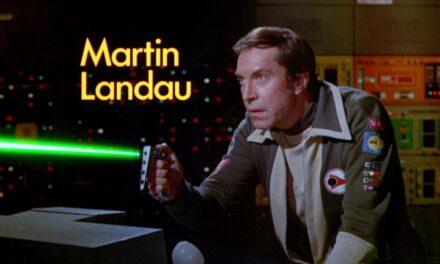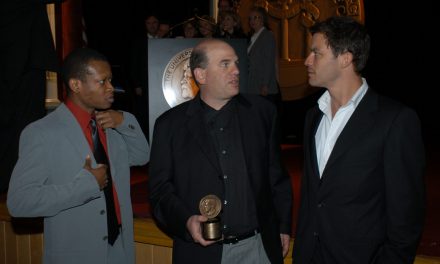Last week, Kim Akass blogged about how the US press response to Adolescence (Netflix, 2025) made visible certain blind spots in a culture seemingly unable to identify that a particular kind of masculinity might be a problem. Akass read this very much through a prism of Trump, and I here want to continue this focus in order to add further consideration to the question of why a convicted felon was elected president by the American people. My approach, however, will be completely different, and was sparked by two television-related observations: the surprise in the face of a student to one of my rather glib comments, and my inability to stop watching the Chinese period drama The Double (Youku, 2024).
Let’s start with my student (and my glib comment). I was trying to situate the increased focus on specific localities in television drama in relation to Covid but also a general shift towards a greater focus on visceral and embodied experiences which I explained I had most clearly noticed when CSI (CBS, 2000-2015) came onto our screens. I remembered clearly, I told the students, having just finished my undergraduate dissertation on the science fiction film of the 1990s which had all engaged with post-modern concepts of simulacra and simulation and taken us into epistemic mazes typical of postmodernism. We knew then, I argued, that we couldn’t access reality but that our reality was only a copy of a copy of a copy of a copy (ad infinitum). Then, CSI came along, bathed in the same blue and green filters as these science fiction films, but returning us to reality which it located in the visceral response we could feel on our own bodies as the CSI-shot entered bodies of victims of crime. In the class, I suggested that this re-orientation in matter, and in particular matter we could feel, lay the ground for the conservativism which would eventually lead to Trump. My student’s face showed surprise at the thought that we had entered a period after postmodernism, but the argument seemed to strike a chord: the question mark on her face became an explanation mark as they hastily put down a note.
A rather tame CSI-shot that takes us into the victim’s jaw in CSI: Miami
I now want to take this back. I do believe CSI wanted to return us to science and matter and things that we could touch and rely on, but with the CSI-shot it actually privileged something else: the viewer’s embodied responses; and these are not scientific facts, but emotions. Of course, this brings up a whole other body of research that asks us to pay attention to how emotion is evoked through television. Misha Kavka’s work on emotion and reality television comes to mind. Her work too emphasises embodied responses and how television engages the viewer’s body through emotions. Similarly, Krystin Gorton has written in depth about television and feelings and has pointed to how audiences are emotionally engaged in the process of watching television. More recently, Amy Holdsworth has published on her own embodied experiences of watching television while describing what it is like to be living with television. What they describe connects to what I am trying to get to here, too, but I want to radicalise this (because this is a blog which allows me to be a bit less nuanced and careful): they (and others, e.g. Garcia) clearly connected to an epistemic turn, away from the philosophical mind games of postmodernism towards a world in which feelings are central. The more I thought about this, the more it made sense: so many of us have tried to argue and reason with Trump supporters, so many have pointed to his incoherence and his evident unsuitability for the role, but to no avail. Trump can literally say anything; it doesn’t matter. What matters is that he has tapped into people’s emotional experience of their lived reality, and that, it seems to me, is one of persistent drama, uncertainty and anger.
It is here, that I want to bring The Double in. Set in the period of the Great Yan (756-763), it begins ominously with the apparent murder of a woman (Xue Li, played by Wu Yinyan) by her husband. By chance, she survives and is sheltered by another woman who has been banned into a prison-like boarding house because her family believes she committed fratricide and attempted matricide. Instead, she was put there by her stepmother who fears the woman’s power due to her being the daughter of the first legal wife. Intrigue and double-crossing continue as Xue Li takes on the identity of Jiang Li (Yang Chaoyue) who unfortunately dies in prison. Xue Li vows to avenge Jiang Li, as well as herself and her family who have been imprisoned and driven into madness by forces working against the emperor and the legal state.
Trailer to The Double which also offers a good bit of romance.
As can be seen from this, the programme, like many other Chinese period dramas, is concerned with infighting and corruption which is set against forces that aim for stability and continuity. None of the opposing sides are shown to be completely evil – they are often just deluded as a result of trauma or mistreatment; and as Xue Li works against these forces, she herself needs to utilise methods that aren’t entirely morally correct – including taking on someone’s identity, using poisons and getting several hundred if not thousand people killed. Thus, her side may have the moral high ground, but only because they work for the established system, which in the Confucian world view is the right thing to do.
What struck me about this drama, however, was how it made me feel: constantly on edge, concerned about consequences and fallouts from new schemes and worried about potential double-crosses. The fact that the drama is set during the Great Yan (though to be fair, this is a largely imaginary Great Yan) which lasted a grand total of seven years and saw no emperor survive for longer than two before being killed by a close relative or subordinate heightened that sense of jeopardy. If the Chinese prize stability over everything, setting dramas during the Great Yan clearly points to something being amiss there too. But to me in the UK, the drama expressed precisely that lack of certainty that Trump’s new administration brought. It created the space to emotionally express what I am currently trying to hold in so as not to constantly scream. And that’s why I couldn’t stop watching.
Trump has similarly tapped into this emotional state of turmoil and heightened it, and by constantly changing the rules of the game while being observed by cameras delivers further opportunities to play these feelings through. While some people have discussed this in relation to outrage culture and some in relation to the ‘deep divisions in our society’, what I am proposing goes further: namely that there has been an epistemic turn that we cannot yet make sense of and that is impacted by a persistent sense of crisis, or poly-crises. We can read this as an outcome of neoliberalism which has undermined workers’ rights while constantly making the individual responsible for everything. But we now have an emotional pressure cooker in the Global North that cannot make sense of itself unless it can find some form of emotional recognition, and it is that which Trump provides. Nothing of this makes any sense in the traditional sense; but we can absolutely sense it. It is only when we can connect to these emotions with compassion and understanding, utilising television to communicate this, that we stand any chance to topple the hold that Trump clearly has.
____________________________________________________________________________________
Elke Weissmann is Reader in Film and Television at Edge Hill University. Her books include Transnational Television Drama (Palgrave) and the edited collection Renewing Feminisms (I.B.Tauris) with Helen Thornham. She is an ECREA editor for Critical Studies in Television. She is currently working on a book on national industries in the transnational world of global high-end drama. She migrated to the UK in 2002 after realising that German television was as bad as she remembered.





